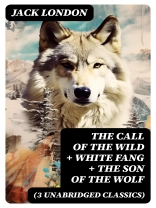Jack London’s ‘The Call of the Wild, ‘ ‘White Fang, ‘ and ‘The Son of the Wolf’ comprise a compelling anthology of unabridged classics that transport readers to the rugged landscapes of the Yukon and the raw wilderness of the American frontier. Written in London’s dynamic, visceral prose, these interconnected tales explore themes of survival, instinct, and the primal bond between humans and animals. The narratives use rich, evocative language that immerses the reader in the elemental struggle for existence, reflecting the author’s keen observation of nature and human behavior amid the backdrop of the Gold Rush era, a time of profound social and environmental transformation. Jack London (1876-1916), an emblematic figure of American literature, drew extensively from his experiences as a gold prospector and a sailor. His firsthand encounters with the unforgiving Alaskan wilderness deeply inform his narratives, imbuing them with authenticity and passion. London’s own tumultuous life, marked by poverty, adventure, and insatiable curiosity about the human spirit, positioned him to explore the intricate relationships of life and death against the stark, often brutal realities of nature. For readers seeking a profound exploration of resilience and the animalistic truths underlying the human condition, this collection stands as a timeless testament to London’s literary genius. Each story serves not only as entertainment but also as an insightful commentary on naturalism and existentialism, making it essential reading for anyone intrigued by the complexities of life and the wilderness.
Sobre el autor
Jack London (1876-1916), born John Griffith Chaney, was a prolific American author known for his gripping adventure tales, social commentaries, and keen naturalist insights, which he often set against the backdrop of the northern wilderness. London’s experiences as a sailor, prospector, and wanderer during the Klondike Gold Rush enriched the authenticity and raw vitality found in his writing. His literary oeuvre reflects a unique blend of Social Darwinism, atavistic themes, and a quest for personal transcendence that have made London an enduring figure in American literature.
London’s seminal works, including ‘The Call of the Wild’ (1903), ‘White Fang’ (1906), and ‘The Son of the Wolf’ (1900), embody his distinct literary style that merges adventure with pointed social critique. ‘The Call of the Wild’, perhaps his most celebrated work, charts the transformation of Buck, a domesticated dog, into a creature of the wild, mirroring London’s views on nature and survival. In contrast, ‘White Fang’ explores the civilizing of a wild canine, set against a backdrop of human greed and redemption. ‘The Son of the Wolf’, a collection of short stories, was London’s first book and probes the life of the Klondike settlers, evoking the harsh and unforgiving environments they endure. London’s narratives, noted for their vivid depictions of the struggle for existence, reflect his own life’s hardships and adventures, and continuously stir the imaginations of readers worldwide.












